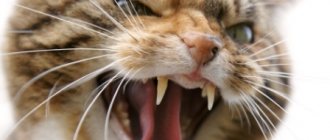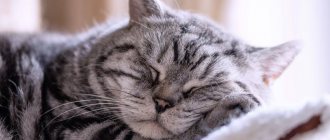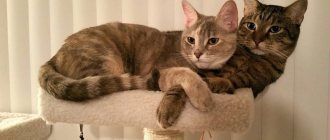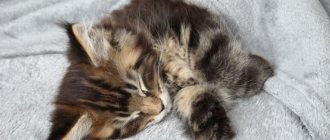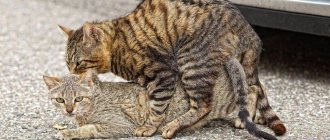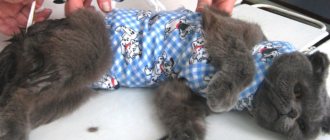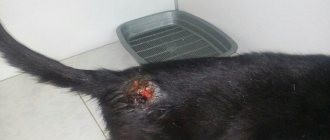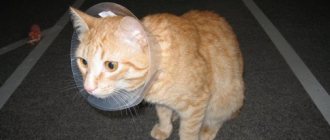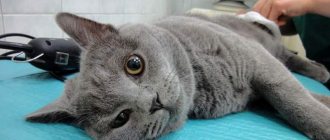A typical surgical operation that can be performed in any veterinary clinic is castration. Every day, thousands of owners bring their pets to specialists, no longer able to tolerate their pets’ cat walks and loud nightly “concerts.” The operation is very quick and the likelihood of complications is low. But still it is there. Often the development of negative consequences is associated with the fact that the cat licks itself after castration.
About the important
Under no circumstances should your pet be allowed to lick a post-operative wound! Along with saliva, hair and bacteria enter the wound canal. This can very quickly lead to the development of purulent inflammation. Considering its localization, this is extremely dangerous; in some cases, the inflammatory process can spread to the organs of the pelvic/abdominal cavities.
As soon as you notice that your operated pet has begun to regularly “slobber” the scrotal area, immediately (!) go to the veterinarian and ask for a surgical (“Elizabethan”) collar. This funnel-like device is placed around the cat's neck. They only take it off for eating. Wearing time is at least a week (but better - 14 days).
But what if neither your veterinarian nor the veterinary pharmacy simply has a surgical collar? You can do it yourself. To do this, you can take either a plastic bottle of the appropriate size, or ordinary cardboard (cutting it in a certain way). The homemade structure is secured to the animal’s neck using wide and soft ties. The difficulty is to securely fasten the surgical collar to the pet's neck (so that he does not throw it off), but not to choke the cat.
What to do when the cat licked the wound once and without consequences, but you want to prevent this behavior in the future without resorting to using a collar?
Hypothetically, applying some bitter substances that are unpleasant to the cat to the skin in the genital area will help cope with the pet’s unwanted behavior. Sometimes the solutions are very atypical. Thus, many foreign veterinarians recommend using Dimethyl phthalate . In general, this drug is a well-known antifungal agent, but its taste is so unpleasant for cats that the animal forgets for a long time about the idea of licking the wound.
In addition, you can immediately consult your veterinarian: today there are many products specifically created for such cases. The specialist will tell you what to do and how to use them correctly.
Postoperative area care
To prevent the cat from licking the wounds and gnawing on the stitches, after the cat has recovered from anesthesia, put on a protective cone (Elizabethan collar) for the pet. A similar accessory can be purchased at a veterinary clinic, pet stores, or veterinary pharmacy. If desired, you can make the collar yourself using cardboard, flexible durable plastic or thick fabric. Give preference to durable material, since the cat will try to pull it off in every possible way.
To ensure that the collar does not cause discomfort to the cat or hinder movement, it must be suitable for the pet in size.
You can also protect the postoperative area from licking by using baby diapers (for newborn babies). For convenience, cut a hole for the tail.
Wound infections caused by licking
The main consequence of “rash” licking a wound is the development of wound infection. It is necessary to monitor your pet and notice in time signs indicating the presence of an inflammatory process.
The essence of the pathology is the proliferation of pathogenic and conditionally pathogenic microflora in the wound area. Even in the mildest cases, the presence of infection significantly slows down the healing process. The main signs that something is wrong are redness, swelling and a significant increase in local temperature. But this does not apply to cases where only two to three hours have passed after the operation.
If purulent discharge appears, you should immediately contact a veterinarian, regardless of how long ago the castration was performed. The consequences of delay are severe, including the death of the pet.
Pain relief after castration.
As a rule, most cats after neutering do not show obvious signs that they are in pain. Moreover, many begin to play and run as usual on the first night after surgery! However, if it is clear that the cat is in pain, there is an opportunity to alleviate his condition.
Contact your veterinarian for pain relief tablets or drops. If the cat is old or has liver or kidney disease, some medications are not recommended, so it is better to leave their choice to the doctor.
You CANNOT treat a cat with human painkillers. Many human drugs are toxic to cats. In particular, never give cats panadol or paracetamol (also known as acetaminophen)!
Keep the cat in an enclosed, quiet room. If children or other animals run around it, they may accidentally damage the stitches, which will cause pain in the cat. In a calm state, the pain should gradually subside.
Development of purulent inflammation
Most often, owners of operated animals contact the clinic only when the entire surgical area is swollen, inflamed, and purulent exudate flows profusely from the scrotal cavity. By the way, often licking a post-operative wound is not a “whim” of the cat himself. This happens when a pet is in pain and he tries to cope with the pain reaction in ways available to him.
In cases where your recently neutered cat cannot live without constantly licking the wound, it makes sense to take him to the vet: perhaps your pet does not need a surgical collar, but a course of antibiotics (or even additional surgery).
You should urgently call a specialist in cases where blood is constantly leaking from the scrotum in large volumes. Sometimes this indicates poor-quality ligature placement or other postoperative complications.
In most cases, signs of purulent inflammation become obvious a few hours or a couple of days after surgery. The worst thing is when the cat’s drool (along with hair and other debris) gets into the remote, closed “pockets” of the scrotal bag. In this case, inflammatory processes develop there. In the absence of air and 100% humidity, the pyogenic microflora feels ideal, which is why huge (often multiple) abscesses develop in the scrotum and adjacent tissues.
There are many cases where such abscesses, suddenly bursting, became the cause of the death of an animal from diffuse peritonitis.
Castration of cats depending on age
The most favorable period is from seven months.
The veterinarian will determine how developed the animal is, its organs, whether the cat is physically prepared for the operation, and whether there are any contraindications.
At a young age, cats do not yet have experience of sexual life, so they tolerate the procedure more easily.
You can also castrate an adult pet up to five years old. But old age can lead to complications during the rehabilitation period.
Other predisposing factors
However, not every situation is actually to blame for the “cat-lizun”. It happens that wound infections in operated animals developed as a result of poor postoperative care (or its complete absence). For some reason, many owners completely forget that even the banal cleanliness of the room in which the cat is kept will allow him to recover much faster.
Advice! Do not bathe your pet in the first week after the procedure; clean its genital area of heavy dirt.
This is especially true for long-haired pets. Cats are very clean animals. If, for example, the scrotal area becomes contaminated with a small amount of feces, the pet will definitely lick its “back regions.” In this case, both saliva and feces particles will enter the wound canal. And this in any case will lead to the development of severe inflammation.
With some cats it is even more difficult: in particular, some Persians do not lick themselves at all. If their groin is contaminated with feces, such a “lazy person” may well end his life due to severe sepsis. It is for this reason that veterinarians strongly recommend that all fur in the scrotal area be thoroughly trimmed before surgery. By the way, you also need to cut your tail. Let the cat end up looking like a cross between a rat and a poodle, but his health will be safe.
Unfortunately, there are also cases where wound infections are caused by careless operation and complete disregard for the rules of asepsis and antisepsis. When a specialist neglects to thoroughly prepare the surgical field (does not cut or shave the hair, for example). It also happens that in specific veterinary clinics there is a real “epidemic” caused by Staphylococcus aureus or certain types of streptococci. Some of their strains are extremely difficult to remove completely.
To avoid serious consequences, we recommend that you do not call the first ad you come across, but carefully study the reviews about the clinic where your cat will be operated on. Finally, we once again emphasize the need for a complete medical examination before surgery. If your pet has some kind of chronic infection or systemic disease in the compensation stage, then after castration all these diseases will “bloom” and manifest themselves in all their glory.
Limitation of mobility.
Healing of wounds after castration takes from 7 to 14 days, so it is recommended that the cat lead a quiet lifestyle during this time - this will allow the stitches to heal better.
Even if the cat feels well, runs and plays with its usual activity, you should not let it outside (at least 7 days). This will prevent excessive physical activity, which could interfere with healing, and will also prevent dirt and dust from entering the surgical wounds.
Elimination methods
Regardless of the type of wound infection, be it cases when a cat licks a wound or bacterial contamination of the postoperative area, it is necessary to show the animal to a veterinarian as soon as possible. If you don’t waste time and “catch” the disease at an early stage, it is quite possible to cope with it by prescribing your pet a course of antibiotic therapy. Unfortunately, in cases where the wound is severely inflamed and signs of a necrotic process are observed , a repeat operation is necessary , during which the dead tissue is surgically removed, and the wound channel is completely cleaned and sanitized of exudate.
Be that as it may, in such situations it will take at least two weeks for the cat to fully recover, and during this time the pet requires daily care.
Feeding a neutered cat
Owners are interested in the question of when can they feed and what after the manipulation?
As a result of the effects of anesthesia, as well as due to severe pain, the cat may not have an appetite in the first hours after castration.
There is no need to force him to eat, this will only irritate the animal. But it is important to monitor whether your pet drinks.
Water should always be available, fresh and clean. When an animal is sick, it is always thirsty.
If you monitor what changes occur in a cat’s behavior after castration, you can note an increase in interest in food. You should not indulge a large appetite, as gluttony can lead to obesity and the appearance of urolithiasis.
But a complete lack of appetite is also a bad factor; you need to find out from the veterinarian why your pet is not eating.
Veterinarians recommend feeding the animal dry food. Its advantage is that it acidifies urine. Such a diet will be a good prevention of urolithiasis. But it is mandatory to drink plenty of fluids, three times the amount of food.
Castration: features of the operation
Light-colored litter in the tray will help identify if the wound is bleeding. If bleeding continues for a long time, you should take the cat to a specialist.
It is better to take a soft, non-irritating filler. Dangerous is the lack of desire to go to the toilet, small or large. It's worth trying to give him some Vaseline oil, it should help.
It’s not scary if the first few days of urine are very small, but then its amount should increase. After castration, cat urine becomes less pungent in smell.

